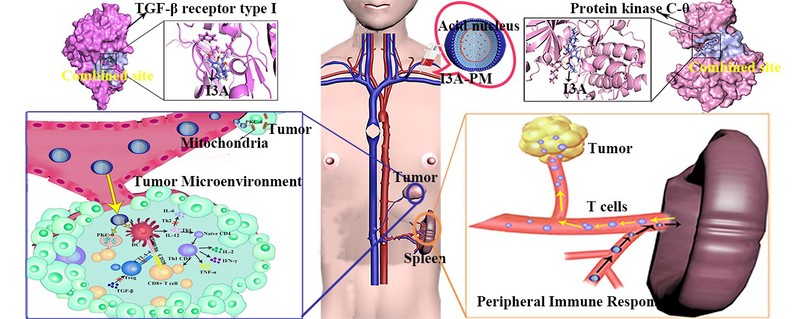Cancer-Immunotherapy was the most exciting topic. However, either insensitivity due to singleness of therapeutic target or immune evasion leads to the failure of the treatment. Ingenol-3-mebutate (I3A) is a major active compound derived from the sap of the Euphorbia peplus plant, which can inhibit cancer through synergy between immunotherapy and chemotherapy in vitro, however, the speculation and accurate mechanism haven’t been confirmed in vivo limited by its hydrophobicity and pH-instability (preferred aprotic solvent with 2.5<pH<4) , which also hindered its clinical translation.
Herein Associate Professor Wang Cheng and his team members developed a polymeric micellewith ‘acidic core’ provided by single alcoholic hydroxyl (-CH(CH3)-OH) encapsulating I3A (I3A-PM), which successfully overcome the aforementioned problems and reduce the toxicity in vivo. Furthermore,they employed a syngeneic mouse model of S180 tumor to investigate the in vivo anti-tumor efficacy and immunostimulatory effect, and found I3A-PM showed a significant anti-tumor effect, the highest tumor inhibition rate reached 80.25%. In addition, I3A-PM also has a strong immunostimulatory effect, and promoted Th1 polarization by upregulating the level of Th1 cytokines (IL-12, IL-2, IFN-γ and TNF-α), and accelerated the expansion of CD4+ and CD8+ T cells, meanwhile, I3A-PM depleted regulatory T cells, Th2 cytokine IL-6 through inhibiting TGF-β signaling pathway. Dr. Wang further appealed to virtual screening of tumor target, and found a new pathway of I3A as a TGF-β receptor type I inhibitor to improve immunostimulatory effects. These results demonstrated I3A-PM as a promising nanoagent for cancer immunotherapy strategy. The synergistic therapeutic effects are encouraged to further evaluate in different cancer model compared with commercial products to facilitate research finding (I3A-PM) entering the clinic.

The research results were published in "Journal of Controlled release" (IF= 7.9).
School of Medicine and Pharmacy of Ocean University of China is the first corresponding institution. M.S. Yu Mian and Dr. Zhao Miaoqing are co-first authors. Associate Professor Wang Cheng and Professor Xia Ming are co-corresponding authors. Associate Professor Yu Rilei, M.S. Chu Xin and M.S. Xu Jiahao are co-authors. This work was financially supported by Fundamental Research Funds for the Central Universities (201964018), National Natural Science Foundation of China (NSFC31872754, NSFC81672093, NSFC81770979), Qingdao Program for Original Innovation and Foundamental Research (18-2-2-73-jch). The article were published in Journal of Controlled Release (IF = 7.901) No. 304 on May 6, 2019.
Link: https://www.sciencedirect.com/science/article/pii/S016836591930255X
Journal of Controlled Release ( IF 7.877 ) Pub Date : 2019-05-06 , DOI: 10.1016/j.jconrel.2019.05.007
【Close】




